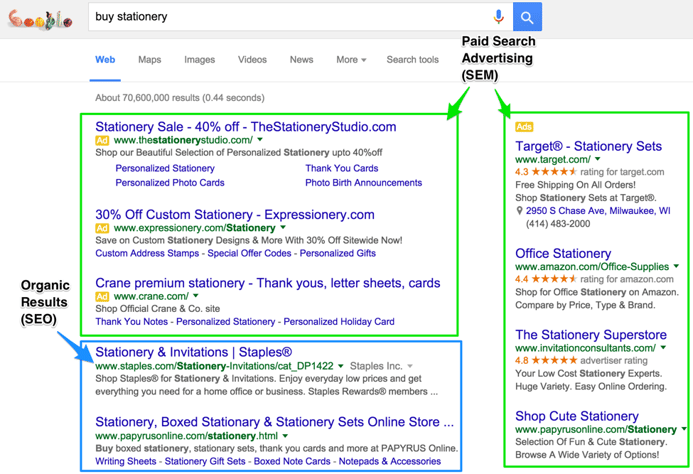Have you ever thought about doing paid search advertising campaigns but you're not sure where to start? Or maybe you currently have someone running them for your company but you don't feel like you're getting as much out of them as you'd like? Hopefully these tips will help you get started or improve your current efforts!
1) Learn What Paid Search Is
Paid Search, also known as Search Engine Marketing (SEM), refers to activities involving the paid advertising results returned on a search engine results page (SERP) when you search for a particular query. This is in contrast to organic search results, which are a result of search engine optimization (SEO), appear below and to the left of the ads, and are not paid for (at least not directly).

 The first step to getting started with paid search advertising is to learn what it actually is and what it can do for you. Below are some of the main benefits:
The first step to getting started with paid search advertising is to learn what it actually is and what it can do for you. Below are some of the main benefits:
- Pay-per-click (PPC) only pay when someone clicks on your ad
- Show ads to people actively searching for something (versus passively showing display ads next to content on a site)
- Write and test your own ad copy
- Show ads above competitors in organic search results
- Display additional information such as location, phone number, reviews, social media, etc.
- Bid on keywords in a real-time auction to find what queries drive the best users
- High control of what landing pages you are sending users to and matching the ads and content to exactly what they are searching for
- High control of geographic targeting, ad scheduling, and device targeting (mobile, tablet, and desktop)
- Easily track results on your website (transactions, downloads, etc.)
The largest and most widely used online advertising platform is Google AdWords. Next in line, and also very similar in features and layout, is Bing/Yahoo! Ads. Each of these platforms offers paid search advertising as well as display options. Google AdWords takes it a step further and offers both video advertising and remarketing features. Choosing the best one for your business is a matter of deciding what you want out of it…which brings me to the next step.
2) Decide What You Want Out of It
What problem(s) do you want this to solve for your business?
You may want to sell more products on your eCommerce site. You might be a lawyer who wants people to sign up for free consultations. You might be a marketing agency looking for potential customers to download a whitepaper.
Whatever the case, get as specific as possible. “I want more traffic” is not specific and will lead to disappointment and money down the drain.
3) Identify Key Players (Internal & External)
If you are a manager, CEO, or other key decision maker within the organization you may understand the strategy behind paid search, but you likely don’t have the time, let alone technical skill, to properly execute an awesome campaign.
This is where your key players come in. They will help you figure out the details, make specific recommendations, and manage the success of the campaign.
Whether you decide to use your internal team or hire an external agency or consultant depends on a few factors. Many companies will need both in order to be successful. Expecting a general marketing person, someone in IT, an intern, or any other employee—except someone who is hired for the purpose of PPC marketing and is at least certified in Google AdWords and Analytics, has some good experience, and a desire to learn—is generally a costly mistake.
Even if Joe Shmoe, your social media intern, says he’s run a PPC campaign before for his aunt Lucy’s pet salon, I would ask him a few tricky questions first to be sure:
- What is the default campaign type in AdWords? (Answer: Search with Display Select: something you generally do not want if you are not looking to hemorrhage dollars on people accidentally clicking your ad in the display network.)
- What’s the best way to link Google AdWords and Google Analytics to share data from each platform (Answer: You need to link Analytics to AdWords from within the AdWords admin panel AND link AdWords to Analytics through the Analytics admin panel to get the most out of each.)
- What are the keyword match types and which ones is the best to use? (Answer: It depends. Broad match will return ads for the broadest amount of search queries, +modified +broad +match is more targeted, “phrase match” even more, and [exact match] the most.)
If he stumbles over any of these then hire an outside consultant or agency that specializes in SEM/SEO. A good consultant or agency will be pricey but efficient, transparent, and work very well with your marketing department. If they are truly good at what they do, they will not string you along or hide/inflate costs, and they should easily be able to show you the impact of their efforts on your organization’s website. Also, make sure you are being sold by the experts themselves—not the agency’s salesperson who may just want to increase his own paycheck no matter if the services are a good fit or not.
4) Decide How Success Will Be Measured
This ties to Step 2, but can’t truly be defined until the key players are involved. Measuring success may not be as easy as you thought in the beginning, but a good team will be able to come up with a good system—if not become able to calculate an actual ROI.
Be diligent here and, again, don’t measure success by metrics like the number of visitors you are getting or how many impressions your ads received. You need the goals to be as specific as possible and you need your team to put measures in place to ensure that you can actually find out if your goals are being reached or not.
Take the example above. This campaign had a goal to make a positive return by selling products on the website. The campaign spent $56.41 and received $403.04 in direct revenue. This makes for a return on ad spend (ROAS = revenue/cost) of $7.1. In other words $7.14 for every $1.00 spent!
You can also take this a step further to factor in management costs, etc. The point is that the advertisements should be offering you a positive return of some kind, even if it’s difficult to measure the actual dollar amount. It’s up to you and the person running the campaign to make sure you aren’t wasting money, and if you are, what you can do to turn things around.
5) Identify Project Steps, Timeline, and Budget
Now that you know what paid search is, what you want out of it, who the key players are, and how success will be measured, you can move along to identifying project steps, timeline, and budget/costs. Typically, your key players will help you identify specifics for the following:
- Set-up
- Starting media budget and schedule
- Keyword research
- Ad copywriting
- Landing page development
- Goal tracking
- Billing
- Launch/implementation
- On-going management
- On-going optimization and management
- On-going/seasonal media budget
- Reporting
6) Implement & Optimize
Once everything has been carefully planned out, the landing pages have been created, the keywords and ads decided on and built into a logical campaign structure, billing set up, the settings squared away, etc., then it is time to implement the campaign!
The first few days and weeks always require the most optimization so make sure you check in with your people to get frequent updates during this period. Many a faulty campaign has been launched, forgotten about, and accrued unnecessary costs that could have easily been curbed by a quick breeze through the account after launch. I even heard of one painful tale involving the accidental spend of $90,000—three times the planned media budget for the year—over a weekend because of lack of attention to detail. You don’t want this to happen to you.
If you follow these steps carefully, however, you could be on the way to reaping the benefits of one of the most effective marketing mediums available to websites today!
Posted by Luke Cerny

Luke Cerny is a passionate online marketing consultant with experience in PPC, SEO, and web analytics. Working both client and agency-side in the past, he brings a wide breadth of knowledge to the table for B2B and B2C clients alike. In his free time, Luke enjoys traveling, writing songs, and being a doggy-dad at his home in Milwaukee, WI.


 Email
Email Facebook
Facebook LinkedIn
LinkedIn